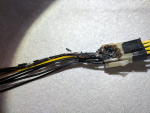As you've shown, cable length is not likely to be a big difference; the biggest difference is what pin is crimped on the end of the cables.
These guys do a good job of listing the connectors, With Pin Numbers.
All about the various PC power supply cables and connectors
www.playtool.com
Most of you know that Molex made the connectors for PC's, and still own the basic designs, even though the patents expired long ago.
Most of the 12V pins are rated at 6 or 7A; the 4 pins in the 8 pin PCIe connector comes up to 336W, a comfortable margin for the stock design.
This says in smaller housings, the brass terminals can go 9A.
However; few of us are at stock levels; I've seen my CPU draw 250W, and that's not counting the draw from the RAM, which also runs off that plug.
These ratings are from the High Quality, Molex brand connector pins; what's actually in that noname cable extension you bought off Amazon?
That likely has a bigger bearing on performance than the cable length; pin retention pressure, gauge of metal, is it beryllium copper, brass, or steel?
I've seen steel pins in those cheap connectors; if it sticks to a magnet, throw it away, lol.
Thanks for the article; it makes me want to measure some actual drops in my systems, especially the ones with splitters on drives.
It would be interesting to get a bunch of the cheapest connectors, and watch them burn.


